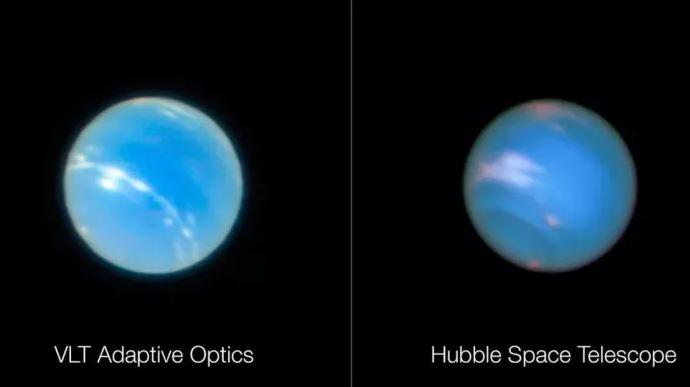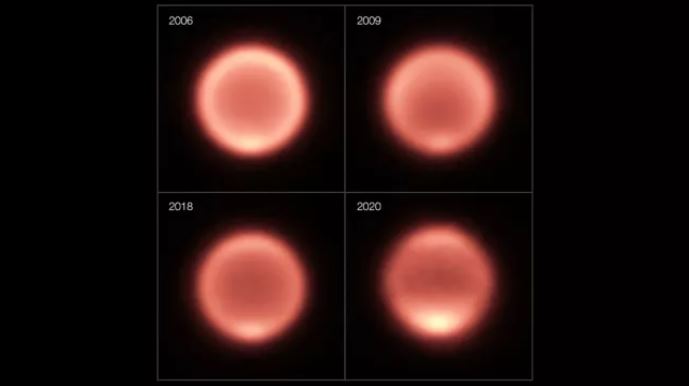Neptune Is Cooling Down Instead Of Getting Warmer And Scientists Are Puzzled

Findings of distant Neptune were only conceivable in the last few decades, and researchers know too little about the planet’s natural seasonal cycle. Neptune is cooling down instead of getting warmer and scientists are puzzled over this matter.
Observations spanning two decades disclosed an unforeseen cooling of the solar system’s most faraway planet, Neptune, during its astronomical summer.
Neptune orbits the sun at a distance 30 times greater than Earth, with one year that would last 165 Earth years. Seasons on the ice giant are also much lengthier than those on Earth, lasting upwards of 40 Earth-years.
Over the last two decades, as the planet entered its southern summer, astronomers noted its globally averaged temperatures fall dramatically by an astounding 14 degrees Fahrenheit (8 degrees Celsius).
“This change was unexpected,” said Michael Roman, a postdoctoral research associate at the University of Leicester and the paper’s lead author. “Since we have been observing Neptune during its early southern summer, we would expect temperatures to be slowly growing warmer, not colder.”

An image of Neptune taken by the Very Large Telescope of the European Southern Observatory (on the right) and one captured by the Hubble Space Telescope (on the left). (Image credit: ESO/P. Weilbacher (AIP)/NASA, ESA, and M.H. Wong and J. Tollefson (UC Berkeley))
The researchers examined findings in the heat-carrying infrared region of the light spectrum made by a few of the world’s best telescopes between 2003 and 2018, such as the European Southern Observatory’s (ESO) Very Large Telescope in Chile, the Keck and Subaru Telescopes in Hawaii, and NASA’s Spitzer Space Telescope.
The identified cooling, however, was not uniform, according to the researchers.
Measurements of Neptune’s stratosphere, the planet’s second lowest layer of atmosphere, demonstrated a warming pattern above Neptune’s south pole. This set of data, which only included statistics from the years 2018 and 2020, indicated a rapid temperature increase of about 20 degrees F. (11 degrees C). According to the researchers, such polar heating has never been witnessed on Neptune previously.
Even so, findings of distant Neptune were only conceivable in the last few decades, and researchers know too little about the planet’s natural seasonal cycle.

This composite shows thermal images of Neptune taken between 2006 and 2020. The first three images (2006, 2009, 2018) were taken with the VISIR instrument on ESO’s Very Large Telescope while the 2020 image was captured by the COMICS instrument on the Subaru Telescope. (Image credit: ESO/M. Roman, NAOJ/Subaru/COMICS)
“Our data cover less than half of a Neptune season,” Glenn Orton, Senior Research Scientist at JPL and co-author on the study said in the statement. “So no one was expecting to see large and rapid changes.”
Scientists are not sure what causes the unforeseen temperature volatility, but they suspect it has something to do with the sun’s 11-year cycle of activity, or the recurring ebb and flow of sunspot generation by the star.
“The temperature variations may be related to seasonal changes in Neptune’s atmospheric chemistry, which can alter how effectively the atmosphere cools,” Roman said. “But random variability in weather patterns or even a response to the 11-year solar activity cycle may also have an effect.”
Previous research proposed a connection between the number of sunspots and Neptune’s luminance. The new research also discovered indications of a possible link between the solar cycle, the brightness of clouds in Neptune’s atmosphere, and the temperature of its stratosphere.
Researchers presume that upcoming findings will shine some light on the conundrums of the remote planet. The James Webb Space Telescope, the most powerful space observatory ever constructed, is bound to make significant advances in our comprehension of Neptune as well as the other solar system ice giant, Uranus.
“The exquisite sensitivity of [JWST’s] mid-infrared instrument, MIRI, will provide unprecedented new maps of the chemistry and temperatures in Neptune’s atmosphere, helping to better identify the nature of these recent changes,” said Leigh Fletcher, Professor of Planetary Science at the University of Leicester and a co-author of the new study.
- Source : GreatGameIndia


















